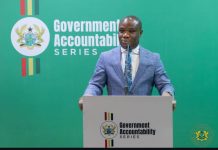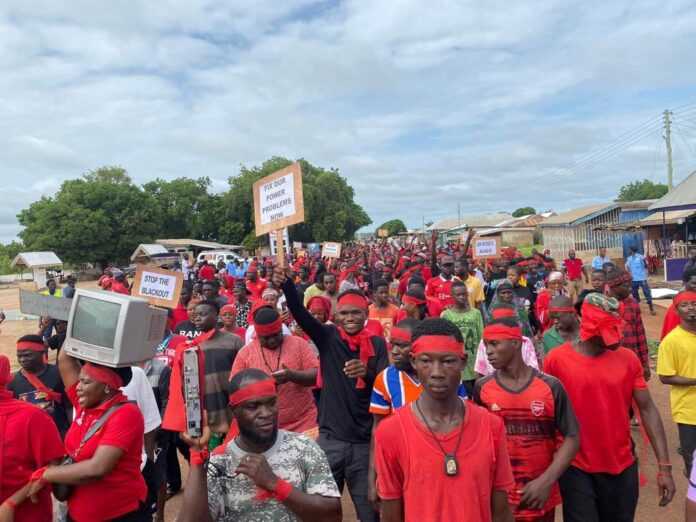The Supreme Court of Ghana is set to deliver a crucial verdict today on the contentious case surrounding the declaration of four parliamentary seats as vacant, a decision that has sparked intense political debate and raised questions about the constitutional powers of the Speaker of Parliament, Alban Bagbin.

The case, brought forward by the Majority Leader, Alexander Afenyo-Markin, challenges Speaker Bagbin’s unilateral decision to declare these seats vacant without judicial oversight or the initiation of by-elections.
On October 17, 2024, Speaker Bagbin declared the seats of the affected Members of Parliament (MPs) vacant, arguing that they had violated constitutional provisions, particularly regarding their eligibility to hold office.
Bagbin’s decision followed what he described as a breach of parliamentary duties and the Constitution.
However, Afenyo-Markin, who represents the ruling New Patriotic Party (NPP), contends that Speaker Bagbin overstepped his constitutional authority by making this decision without involving the judiciary.
He argues that only the judiciary has the power to interpret the Constitution in cases like this and that the Speaker’s actions bypassed due judicial process.
According to Afenyo-Markin, Bagbin’s declaration, made independently of any legal process, has effectively disenfranchised the constituents in the affected areas, depriving them of proper representation.
The dispute centers on the interpretation of the Constitution, with Afenyo-Markin emphasizing that such matters should be handled by the courts, not by unilateral declarations from Parliament’s leadership.
In his legal suit, Afenyo-Markin has requested the courts to clarify the powers of the Speaker regarding parliamentary vacancies, seeking a judicial ruling on whether the Speaker can unilaterally remove MPs from office without due process.
In response to Afenyo-Markin’s suit, the Supreme Court issued an injunction on November 11, 2024, preventing any further actions regarding the vacant seats until the final judgment.
However, Speaker Bagbin challenged this injunction, filing a motion to reverse the Court’s order, arguing that freezing his decision undermines his responsibilities as Speaker and his authority to maintain parliamentary order and integrity.
Bagbin contended that his actions were within his powers and that the injunction interfered with his constitutional role.
The Supreme Court dismissed Speaker Bagbin’s motion to lift the injunction, upholding its previous ruling.
This decision set the stage for today’s final judgment, which will have significant implications for the balance of power between the judiciary and Parliament, as well as for the representation of the affected constituencies.
The outcome of this case is eagerly awaited, as it not only affects the political landscape in Ghana but also serves as a defining moment for the interpretation of parliamentary powers under the 1992 Constitution.
The ruling will also provide clarity on the role of the Speaker of Parliament in matters of parliamentary vacancies and the limits of executive authority in the legislative process.





















































![[FREE FREE MONEY] Predict and Win a Guaranteed GH¢200 From Us EVERY WEEK](https://wordpress.ghanatalksradio.com/wp-content/uploads/2022/02/Predict-and-Win-Final-09-03-2021-218x150.jpg)
![[Predict & Win – 8th/Oct.] WIN A Guaranteed ¢200 From Us This Week](https://wordpress.ghanatalksradio.com/wp-content/uploads/2021/10/maxresdefault-16-218x150.jpg)
![[Predict & Win – 2nd] WIN A Guaranteed ¢200 From Us This Week](https://wordpress.ghanatalksradio.com/wp-content/uploads/2021/09/maxresdefault-50-218x150.jpg)
![[Predict & Win – 25th] WIN A Guaranteed ¢200 From Us This Week](https://wordpress.ghanatalksradio.com/wp-content/uploads/2021/09/maxresdefault-36-218x150.jpg)
![[Predict & Win – 18th] WIN A Guaranteed ¢200 From Us This Week](https://wordpress.ghanatalksradio.com/wp-content/uploads/2021/09/maxresdefault-23-218x150.jpg)






![[National cathedral] See full list of churches that have contributed since 2018](https://wordpress.ghanatalksradio.com/wp-content/uploads/2020/09/Ghana-National-Cathedral-GhanaTalksRadio-100x70.jpg)

![[W/E-10/11/21] DAILY NEWS SUMMARY: Power Outages, Bernardo Silva, Facebook, more](https://wordpress.ghanatalksradio.com/wp-content/uploads/2021/11/maxresdefault-18-100x70.jpg)

